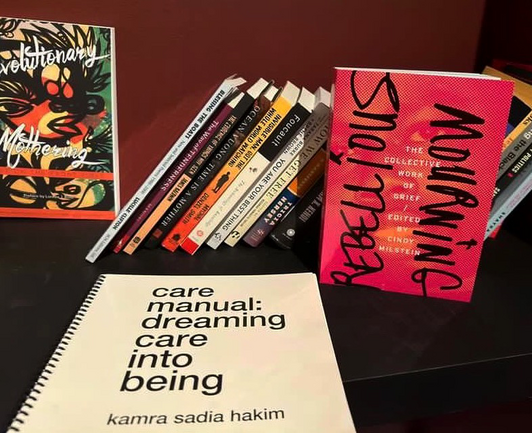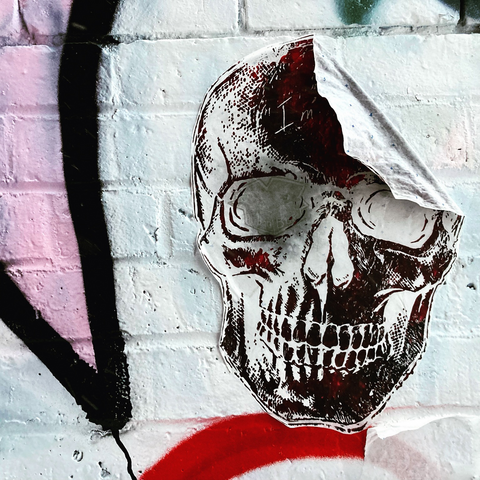Cindy Milstein · @cbmilstein
2173 followers · 286 posts · Server kolektiva.socialGrief lands us in unexpected places. And it’s how we create collective room for processing it that allows us to journey through our grief in ways that make it more bearable, especially related to unnecessary losses.
Yet it still felt surprising to see my edited anthology “Rebellious Mourning: The Collective Work of Grief” (@AKPress, with poignant design by @eff_charm, including cover art honoring David Ware, a Black man murdered on January 23, 2007, by police in Ypsilanti, Michigan) in a literal room in a museum—a respite room, to be exact.
The term “respite” refers to offering temporary care in the form of a period of rest and relief. Meaning it’s only an interval in the grinding violence of, in this case, anti-Black racism.
Such respite feels crucial in the context of this museum exhibition, “An Archaeology of Silence,” being held now at the @deyoungmuseum. The exhibit is described thusly: “Artist Kehinde Wiley’s new body of paintings and sculptures confronts the silence surrounding systemic violence against Black people through the visual language of the fallen figure. … [Deaths] are transformed into a powerful elegy of resistance. The resulting paintings of figures struck down, wounded, or dead, referencing iconic paintings of mythical heroes, martyrs, and saints, offer a haunting meditation on the legacies of colonialism and systemic racism.”
Mourning and honoring the systemic loss of Black life should include some comfort, some relief. But how could this not be temporary given the lengthy, genocidal history of anti-Blackness along with the ongoing brutality of white supremacy, policing and prison systems, and increasingly outright fascism?
The choice of “respite” for a room filled with grief-related books and, I imagine, some breathing space from the heaviness of this exhibition feels appropriate: there can be no real, sustained relief in this world. How we mourn, though, has an intimate, inseparable relation to how we go about fighting for social transformation—or it should. Our ancestors, so many of them still existing as “unquiet ghosts” far from being at peace, demand no less.
#RebelliousMourning
#NoMoreStolenLives
#CollectiveWorkOfGrief
https://www.akpress.org/rebellious-mourning.html
(Thanks to Steve Rhodes for sending me this photo)
#RebelliousMourning #nomorestolenlives #collectiveworkofgrief
Cindy Milstein · @cbmilstein
2139 followers · 277 posts · Server kolektiva.social“How’s your covid grief these days?”
Those words, which traveled across an ocean and many borders as a DM, supplied a recognition that’s too rare in this so-called post-pandemic world: someone else feels stuck in mourning.
For without collective reckoning of what humanity has gone and is still going through …
Without collective processing of the innumerable losses as our sacred shared duty …
Without public do-it-ourselves altars, memorials, and other pandemic grief spaces woven into the public landscape, acknowledging the immensity of the collective and individual trauma and myriad absences …
Without honoring our dead and actively fighting for the living …
Without collective care for those who are sick, disabled, grappling with long covid, or dying …
Without people routinely inquiring into each other’s losses in this world where there’s so much to mourn and grieving demands its own good, communal time …
Without masks and other visible gestures of everyday forms of looking out for the well-being of all …
Without regard for how some people are being cut off from living fully and in community because they are at risk while so much of social and work life is “back to normal” …
Without those in our own anarchist(ic) circles steadfastly, reciprocally, and without question always including and lovingly abiding by covid and other harm reduction as practices in all our spaces …
How can one not be stuck?
How can one not feel dead inside? A hollow shell? Alone?
Grieving needs the company of others, not merely to hold the profundity of any loss and make it more bearable, but to witness, believe, and remember the loss, and thus integrate it into how we want to move forward.
Without that, especially in the face of the human-made catastrophe of a global pandemic, most of humanity has shifted backward into a delusional normal that denies both death and qualitative life, thereby ensuring the hum of a murderous social system.
A few, too few, take time to ask each other and really listen to the reply, “How’s your grief?”
With that small act, mourning rebelliously finds some ground from which to mend this world.
#CollectiveCare
#RebelliousMourning
#CollectiveWorkOfGrief
(photo: black-and-white etching-style image of skull wheat pasted on a white-painted brick wall, with the edge of the forehead peeling off a bit, as seen in Tio’tia:ke/Montreal, winter 2023)
#CollectiveCare #RebelliousMourning #collectiveworkofgrief

